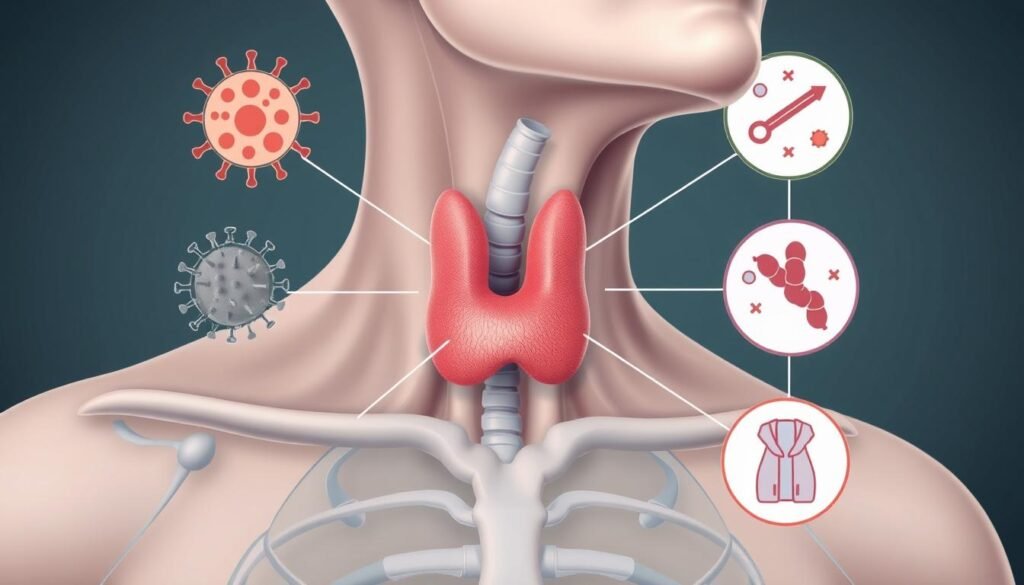Did you know that our bodies have over 50 different hormones? These hormones help control various bodily functions. Today, viral infections are affecting these hormonal functions more than ever. They can lead to health issues like fatigue and autoimmune diseases. It’s important to understand how viral infections and hormonal imbalances interact. This can help us recognize symptoms that may harm our health.
This guide will discuss how viral infections can cause hormonal imbalances. We’ll look at the symptoms of these changes. You’ll learn about the link between infections, hormonal health, and their long-term effects. Understanding these connections helps us handle hormonal problems better, especially with today’s infections. For those looking to improve adrenal health and fight fatigue, changing your diet, managing stress, and using natural remedies are key. Find out more in this detailed article.
Key Takeaways
- Over 50 hormones regulate various bodily functions.
- Viral infections can lead to significant hormonal imbalances.
- Recognizing symptoms is crucial for managing health issues.
- Autoimmune responses can complicate hormonal regulation.
- Diet and lifestyle play vital roles in supporting hormonal health.
Understanding Viral Infections
Viral infections are caused by viruses, tiny invaders that grow inside living cells. They affect millions globally every year, leading to significant health issues. For instance, the common cold and flu are common viral infections. They trigger many symptoms. Knowing about these infections is key to preventing and treating them.
Types of Viral Infections
Humans can catch different types of viruses. Each causes unique illnesses. For example:
- Coronaviruses: This group includes SARS-CoV and SARS-CoV-2, known for severe respiratory issues.
- Influenza viruses: These cause the seasonal flu, a major risk for some people.
- Rhinoviruses: Mainly responsible for the common cold, they have milder effects.
Common Symptoms of Viral Infections
The signs of viral infections can greatly vary. However, common symptoms are:
- Fever
- Cough
- Fatigue
- Muscle aches
These symptoms can be similar to those from hormonal issues, making diagnosis hard. So, knowing them is important for correct treatment.
The Impact of Viral Infections on Hormonal Function
How viral infections impact hormonal function is complex. It focuses on how viruses affect the endocrine glands. Studies show these infections disrupt hormonal balance. They especially look at COVID-19.
How Viruses Affect Endocrine Glands
Viruses have ways to impact their hosts, like mimicking peptide hormones. One key finding is that viruses have peptides similar to human hormones. These can mess with our hormonal functions, leading to problems.
For example, some viruses have peptides that resemble insulin, affecting cortisol and thyroid hormones. These hormones are key for metabolism and stress responses. This can disrupt the body’s normal function.
Case Studies: COVID-19 and Hormonal Changes
COVID-19 has led to many studies on how it affects hormones. About 39% of those recovering show signs of low cortisol. And around 5% experience low thyroid function after recovery.
These changes show COVID-19 can deeply affect the endocrine system. Symptoms like fatigue and cognitive issues can come from these hormonal imbalances. This underlines the importance of more research to fully understand the impacts.
Early research on COVID-19 shows it might trigger autoimmune responses. These can change hormone levels, affecting the body’s stress system.
For more information, visit this resource. It goes into more detail on how viral infections affect hormonal functions.
Common Hormonal Imbalances Explained
It’s key to know about hormonal imbalances to recognize their big impact. Both men and women are affected by over 50 hormone types. These hormones help run different body functions. An imbalance can cause many health issues related to metabolism. Causes include lifestyle, stress, and health problems.
Signs and Symptoms of Hormonal Imbalances
Many different symptoms may point to a hormonal imbalance. Symptoms can vary based on which hormone is off balance. For women, symptoms can be irregular periods and mood swings. Men might notice a drop in sex drive and more body fat.
- For females: irregular periods, anxiety, hot flashes, and weight changes.
- For males: reduced sex drive, difficulty concentrating, and increased body fat.
Other signs like losing muscle or having trouble thinking may also appear. These signs can help tell if you need to see a doctor. The doctor may suggest treatments after checking.
Types of Hormonal Imbalances
There are many hormonal imbalances to watch for. Thyroid issues are common and affect your energy and metabolism. Hypothyroidism and hyperthyroidism come from thyroid hormone problems. They can lead to big health issues.
Other types include:
- Sex hormone imbalances—these may affect fertility and reproduction.
- Growth hormone deficiencies—impacting the body’s physical growth and cognitive function.
- Insulin imbalances—contributing to conditions like diabetes and metabolic syndrome.
- Cortisol imbalances—associated with stress and adrenal function.
Treatments range from hormone therapy to lifestyle changes and supplements. If you have ongoing hormone problems, getting advice from health experts is a good step. They can offer help tailored to your needs.
Viral Infections, Hormonal Imbalances, and More
Looking into how viral infections and hormonal changes are linked is key. These connections are vital for understanding autoimmune diseases and hormone issues. Studies show the effects viruses can have on our hormone balance. This can lead to serious health problems.
Connection Between Infections and Hormonal Fluctuations
Research shows that viruses can mess with how our hormones work. This is especially true for diseases related to hormones. For example, Long COVID affects some people after getting SARS-CoV-2. They may face major hormone swings. Symptoms can look a lot like adrenal problems or thyroid issues. This points to why it’s so important to get how viruses can change our hormone levels.
Autoimmune Responses to Viral Infections
Viruses, like the Epstein-Barr virus, can make our immune system overreact. This can lead to autoimmune diseases. After some infections, people might have an immune system that acts oddly. They could have more unusual monocytes and active B cells. These immune changes can mess with how our glands work. This may result in diabetes or thyroid issues. Understanding the tie between viruses, our immune system, and hormones shows we need more research.

Effects of Influenza and the Common Cold
Influenza and the common cold cause more than just temporary discomfort. These illnesses change how our bodies work, affecting metabolism and hormone levels. Knowing about these impacts can help take care of someone sick.
Influence on Metabolism
Getting sick with the flu or a cold can change how fast your body uses energy, leading to changes in weight. When you’re sick, your body needs more energy to fight off the virus. This could make some people lose weight.
After being sick, some might gain weight. This happens because they might eat more or move less than usual.
Interplay with Hormonal Levels
The way our bodies react to viruses involves hormones in complex ways. Flu can mess with stress hormones like cortisol and important thyroid hormones. Changes in these hormones can affect how we feel and heal.
Lower levels of hormones like testosterone can make flu worse. However, hormones like estrogen might fight off the inflammation that comes with these sicknesses.
| Hormone | Impact During Influenza |
|---|---|
| Cortisol | Increases with stress, affecting metabolism and immune response |
| Estrogen | May protect against systemic inflammation |
| Testosterone | Low levels correlate with severe infection outcomes |
| Thyroid Hormones | Critical for metabolic regulation, altered during illness |
Chronic Fatigue Syndrome and Hormonal Issues
Chronic Fatigue Syndrome (CFS) has symptoms that heavily affect daily life. It’s important to recognize these symptoms. They often overlap with hormonal problems and viral infections.
Identifying Symptoms
Common symptoms of chronic fatigue syndrome include:
- Extreme fatigue that rest doesn’t help
- Sleep problems, like insomnia or sleep apnea
- Trouble thinking clearly, called “brain fog”
- Muscle pain and sore joints
- Post-exertional malaise, where you feel worse after activity
Studies find women get diagnosed with CFS more often than men. Factors like hormonal imbalances play a role. Hormones may be thrown off by birth control pills and hormone treatments. This increases the risk of chronic fatigue symptoms.
Relationship with Viral Infections
There’s a link between chronic fatigue syndrome and viruses. Epstein-Barr and human herpes virus 6 are examples. About 70% of those with CFS trace symptom start to a virus.
Infections can mess up hormone levels, making CFS challenges worse. Hormonal issues can cause fatigue, muscle aches, and thinking problems, just like CFS. A holistic approach may help. It includes hormonal treatment and lifestyle changes for those struggling.

Food Intolerances and Allergies in Hormonal Health
Understanding how food intolerances and allergies impact hormonal health is key to well-being. What we eat affects our hormone levels. It’s important to know how food reactions can affect those with hormonal changes.
Understanding Food Intolerances
Food intolerances are different from allergies. They involve enzyme deficiencies, like in lactose intolerance, and other issues. Symptoms can appear between 30 minutes to 48 hours after eating the bothersome food.
These symptoms can affect the skin, stomach, and lungs. Foods may trigger problems like irritable bowel syndrome and eczema. Tests like hydrogen breath testing and elimination diets help identify intolerances.
Link Between Allergies and Hormonal Changes
Allergies can cause from mild to severe symptoms, unlike food intolerances. Stress can make us more prone to food sensitivities, affecting our hormones. Low thyroid hormone levels can also increase food sensitivity risk.
This connection shows the need to consider diet in unexplained hormonal issues. Since food reactions can cause inflammation, they might lead to hormonal imbalances.
Thyroid Disorders: A Key Area of Concern
The thyroid gland is essential for regulating our body’s functions. Disorders like hypothyroidism and hyperthyroidism are big health concerns. They cause symptoms and complications that affect other health issues, such as viral infections.
Hypothyroidism and Hyperthyroidism
Hypothyroidism happens when your thyroid doesn’t make enough hormones. This leads to feeling tired, being sensitive to cold, gaining weight, and feeling depressed. Hyperthyroidism means your thyroid makes too many hormones. Symptoms include feeling nervous, having an irregular heartbeat, losing weight, and being too sensitive to heat.
Both conditions upset the body’s hormonal balance. This affects your metabolism, heart, and how you feel emotionally.

Autoimmune conditions like Graves’ disease and Hashimoto’s thyroiditis are linked to these thyroid problems. People with these conditions often have worse symptoms. This makes managing their health more complicated.
| Condition | Common Symptoms | Potential Complications |
|---|---|---|
| Hypothyroidism | Tiredness, cold sensitivity, weight gain, depression, irregular periods | Heart problems, infertility, severe depression |
| Hyperthyroidism | Tiredness, heat sensitivity, weight loss, nervousness, irregular heartbeat | Thyroid storm, osteoporosis, heart issues |
Viral infections, like COVID-19, might impact thyroid health. They can disrupt thyroid function during the infection or recovery. These infections might worsen or trigger new thyroid problems.
To diagnose thyroid issues, doctors use blood tests to check hormone levels. Treatment might include medications or, sometimes, surgery. It’s important to regularly check your thyroid, especially if you show symptoms of dysfunction.
Managing Hormonal Imbalances Effectively
Finding lifestyle changes for hormonal imbalances can help a lot. These strategies can improve your health and happiness. By eating better and exercising, you support your hormone health.
Practical Tips and Lifestyle Changes
Adopting lifestyle changes is a big step in managing hormonal imbalances. Here are some key practices:
- Nutritious Diet: A balanced diet with protein, fiber, and healthy fats keeps hormones in check. A Mediterranean diet has even more perks.
- Regular Exercise: Physical activity betters your mood and metabolism. It helps manage your weight too.
- Stress Management: Yoga, meditation, or deep breathing help regulate hormones. These practices reduce stress.
- Quality Sleep: Good sleep is key for producing and balancing hormones. Hormonal issues often disrupt sleep.
- Limit Sugar Intake: Eating less sugar can avoid insulin spikes. It leads to healthier hormone levels.
When to Seek Professional Help
Knowing when to get professional help for hormonal issues is crucial. If you have irregular periods, gain weight without a reason, or experience mood swings, see a doctor. They can give the right diagnosis and treatments, like hormone therapy if needed. Talking openly with a doctor about your symptoms is key to managing well.
| Symptom | Action |
|---|---|
| Irregular periods | Consult a gynecologist for evaluation. |
| Unexplained weight gain | Discuss dietary changes with a nutritionist. |
| Mood swings and anxiety | Seek guidance from a mental health professional. |
| Sleep disturbances | Consider a sleep study if issues persist. |
Conclusion
The link between viral infections and hormonal health is complex but important. Viruses like COVID-19 can affect our hormones, changing our health in big ways. Knowing about this can help people spot and understand symptoms related to hormonal issues or ongoing inflammation.
There’s more proof now that long-term inflammation can harm our hormones and make us sick with viruses. It’s key to watch our health closely. Catching symptoms early helps manage them, improving our body’s functions and lowering the chance of getting diseases like diabetes and heart problems.
Making good lifestyle choices can boost our defense against viral infections and help maintain hormonal health. Eating well, exercising regularly, and managing stress properly are great steps. By understanding these health connections, we can better look after ourselves in today’s changing health scene.